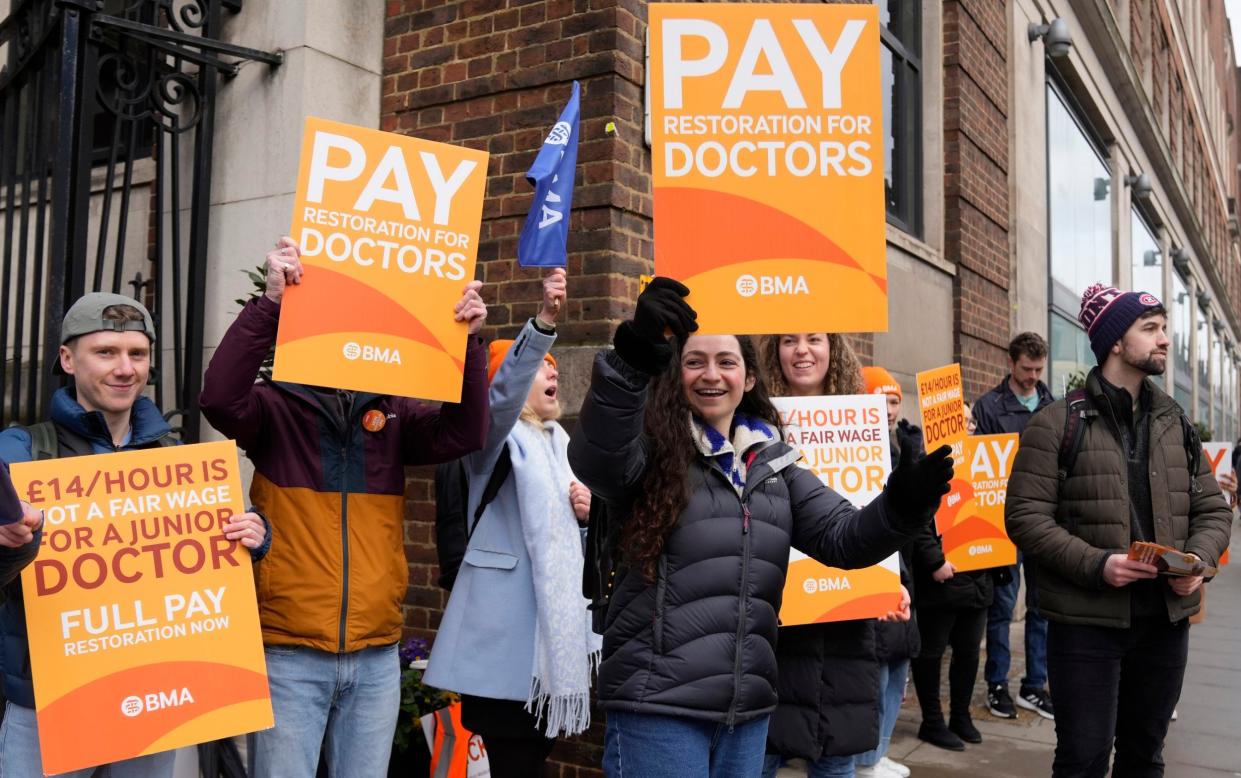Junior doctors’ union announces 96-hour walkout after pay talks break down

Junior doctors are to walk out for four days after the Easter Bank Holiday, the British Medical Association (BMA) has announced.
It follows the breakdown of pay talks with Steve Barclay, the Health Secretary, after junior doctors refused to budge on demands for a 35 per cent pay rise.
A Whitehall source said the BMA was “intent on having a fight”, while the union’s leaders said they were “disappointed” at having to embark on more strikes.
Healthcare leaders said the timing and duration of the walkouts would “ring alarm bells” at every hospital, with pressures already “piled up” after the four-day weekend. They warned that the strike plans posed “a real threat to patient safety” and could see quarter of a million operations and appointments axed.
Three days of walkouts last week resulted in the cancellation of more than 180,000 operations and appointments – a greater impact than all of the other NHS strikes combined.
While other health unions have agreed pay deals with the Government – which will now be the subject of a ballot of members – the BMA’s strikes have already gone further than those of any other union.
The next round of strikes will see junior doctors walk out of A&E, critical care and cancer services, as well as planned care, at a time when the NHS is under heavy pressure.
On Thursday, Mr Barclay tweeted:
I met the BMA’s junior doctors committee yesterday in the hope of beginning constructive talks.
They placed a pre-condition on these talks of a 35% pay rise. That is unreasonable.
My door remains open to constructive conversations, as I have had with other health unions.— Steve Barclay (@SteveBarclay) March 23, 2023
Dr Vivek Trivedi and Dr Robert Laurenson, the co-chairs of the BMA junior doctor committee, said they announced the latest strikes with “disappointment and great frustration”.
They said: “The Government has dragged its feet at every opportunity. It has not presented any credible offer and is refusing to accept that there is any case for pay restoration, describing our central ask as ‘unrealistic’ and ‘unreasonable’.
“Even yesterday they continued to add new unacceptable preconditions to talks instead of getting on and trying to find a resolution. We therefore have no confidence that, without further action, these negotiations can be successful.”
On an internet forum, the BMA co-chairs said it was “unacceptable” that the engagement principles of talks included making them confidential, saying it was “unconscionable to cut off the grassroots movement”.
“They call us militant, we call ourselves organised,” the post continued, vowing: “United we stand.”
In recent months, the BMA has deployed increasingly hardline tactics, instructing doctors not to give hospitals any notice if they were taking part in strikes in order to maximise disruption.
In a podcast in December, Dr Laurenson boasted of a “tremendous shift” in the organisation, saying he wanted to see it being “structured towards more union activity” with doctors “prepared to organise in the long term to fight a plethora of issues”.
Saffron Cordery, the deputy chief executive of NHS Providers, said: “The prospect of a 96-hour strike by junior doctors will ring alarm bells for trust leaders up and down the country.
“It would immediately follow a four-day Bank Holiday weekend, meaning demand will have piled up before the strike even begins on April 11. There will also be no exemptions. This threatens the biggest disruption from NHS walkouts so far.”
Matthew Taylor, chief executive of the NHS Confederation, said: “The level of disruption caused by the last junior doctors’ walkout was greater than that of all the other recent strikes put together, so leaders will be dismayed about a repeat and worried about the impact on patient care, particularly just after Easter.
“Based on last time, it seems likely that up to a quarter of a million appointments and operations may need to be postponed as a result of this next wave of strikes.”
He said the next round of walkouts would be more difficult to cover because so many consultants were due leave after stepping in last week, warning: “This poses a huge challenge to services already stretched by having too few staff, so another walkout poses a real risk to patient safety.”
Mr Taylor urged junior doctors to “further reflect on the potential damage a four-day walkout could do, and what it will mean for patients” and called on the Government to “act decisively to provide a meaningful incentive to make junior doctors reconsider and come back to the table”.
A Department of Health and Social Care spokesman said: “Further strikes will risk patient safety and cause further disruption.”
Other health unions last week agreed a deal with ministers that would mean a five per cent pay rise next year and a bonus of between £1,650 and £3,800 for this year. The proposal will be subject to a vote by members of unions, including the Royal College of Nursing, GMB and Unison.

